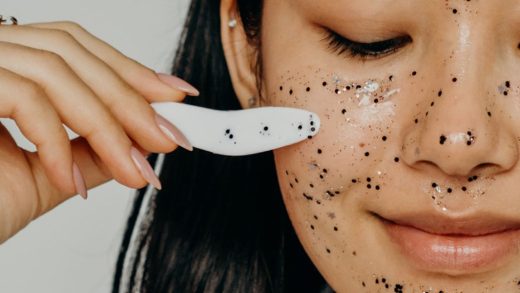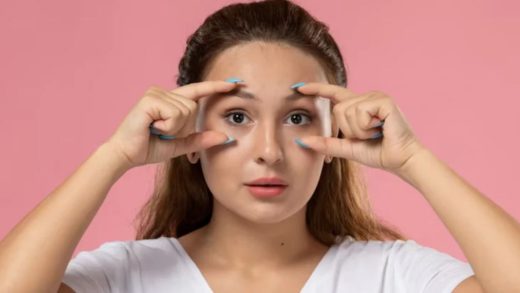In the modern world, a significant number of us spend a significant amount of time immersed in front of a screen of some kind, whether it be a mobile phone, a tablet, or a laptop computer.
All of that time spent in front of a computer, on the other hand, may have an effect on your skin because of the blue light, also known as short-wavelength light, that is emitted. Studies have shown that blue light can cause a variety of skin problems, ranging from premature aging to hyperpigmentation that is dark and persistent.
There is a growing variety of skincare products that have been intended to block dangerous blue light rays and also address some of the consequences that they have. Although it is highly doubtful that any of us are about to give up our phones and laptops, there is a growing variety of blue light-blocking skincare products. However, are all of these items just hype? To what extent do they benefit? Or, assuming that is the case, what exactly do they do? This is a more in-depth look.
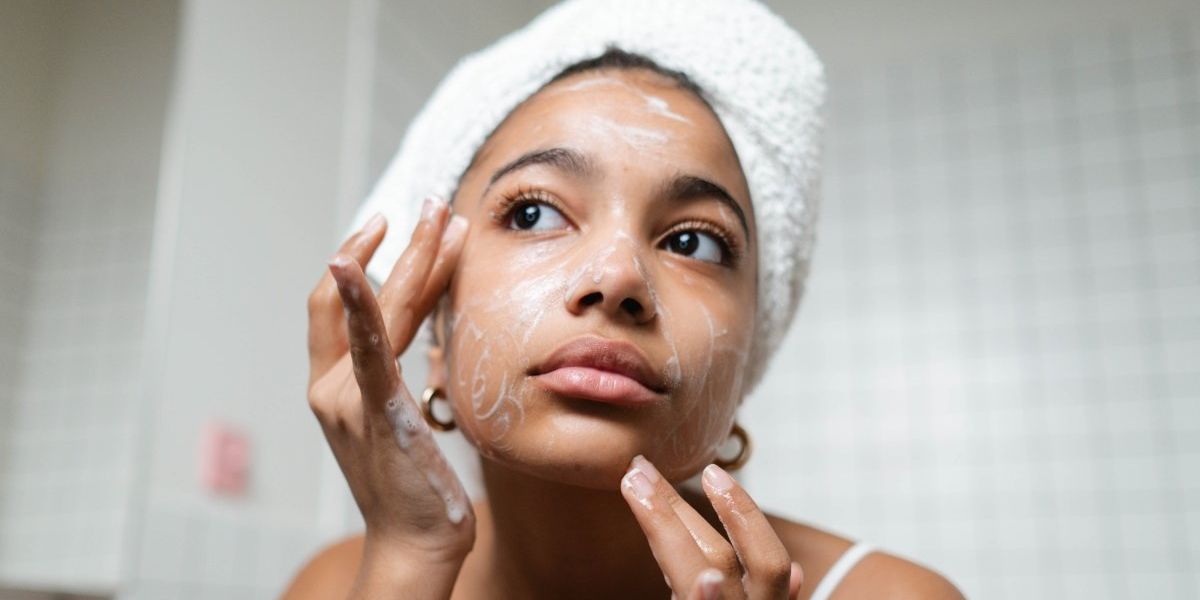
Moreover, it is crucial to keep ahead of the curve in the ever-changing environment of skincare, particularly when it comes to treating the indications of aging as the landscape is constantly evolving.
Blue Light skincare has arisen as a new rival in the anti-aging skincare industry at the same time as we are carefully putting together our treatment routines. There has been a lot of attention paid to the negative impact that blue light has on our skin as a result of the extensive usage of digital devices in our everyday lives. The need to protect our skin from these modern-day aggressors has never been more essential than it is now, as they have the ability to speed up the aging process, cause inflammation, and cause oxidative stress.
We invite you to join us as we discuss the significance of introducing blue light skincare into your anti-aging routine and uncover the ways in which it can revolutionize your approach to preserving youthful and bright skin.
What is Blue Light?

One of the types of high-energy, short-wavelength light that is a component of the visible light spectrum is blue light, which is also referred to as high-energy visible (HEV) light because of its wavelength. The sun, digital screens like those found on smartphones, laptops, tablets, and televisions, and artificial sources like LED lighting and fluorescent bulbs are all sources of this light.
It is also emitted by the sun. Exposure to natural blue light during the day is beneficial for regulating our sleep-wake cycle and boosting mood and alertness. However, exposure to artificial blue light, particularly high-energy violet (HEV) light, for an extended period of time or in excessive amounts, particularly in the evenings and at night, can have adverse effects on our skin and overall health.
A breakdown is as follows:
- Wavelength: The wavelength of blue light is around 400 to 500 nanometers, making it one of the shortest and highest-energy wavelengths in the visible spectrum. Blue light is also one of the most important colors in the visible spectrum.
- Natural Source: The sun is the most important natural source of blue light (also known as ultraviolet light). While we are awake, being exposed to sunlight, including blue light, can assist in the regulation of our sleep-wake cycle, also known as the circadian rhythm, as well as increase our mood and alertness.
- Sources that are artificial: In our day and age, we are not only subjected to blue light from the sun, but also from artificial sources such as digital screens (such as those seen on smartphones, tablets, laptops, and televisions), LED and fluorescent lights, and certain light bulbs that are more energy efficient. These artificial sources, particularly screens, emit huge amounts of blue light, which a large number of people are subjected to for extended periods of time during the day and even into the night.
- Health Impact: An ongoing investigation on the possible adverse impact that blue light may have on one’s health is now being carried out. According to the findings of a number of studies, prolonged exposure to blue light, particularly in the evening and at night, has the potential to disrupt normal sleep patterns by inhibiting the generation of melatonin, a hormone that is responsible for regulating sleep. In addition, prolonged exposure to blue light from digital screens may be a contributor to digital eye strain, which can result in symptoms such as headaches, dry eyes, blurred vision, and eyestrain.
- Protective Measures: The use of blue light filters or special glasses with lenses designed to block or diminish blue light is one method that some individuals employ in order to protect themselves from the potential adverse effects of blue light exposure, particularly when it comes from electronic devices. Screens can be designed to accommodate these filters, or they can be worn as spectacles.
What Effects Does Blue Light Have on Your Face?

The screens of a wide variety of electronic gadgets are continually emitting blue light, which causes our faces to be constantly bombarded with blue light in this age of digital technology.
At the same time that the effects of blue light on our eyes have received a lot of attention, the impacts that it has on our facial skin are just as crucial but are sometimes disregarded. The negative effects of blue light on facial health are significant, ranging from the acceleration of the aging process to the disruption of the creation of collagen and elastin among the skin.
Advanced Ageing Period: The exposure of the skin to blue light causes disruptions in the normal repair mechanisms of the skin, which hinders the skin’s capacity to regenerate and preserve its youthful appearance. When blue light is exposed to the skin for an extended period of time, it can cause the skin to lose its firmness, elasticity, and overall vitality, which can contribute to the premature aging process.
Contributes to the production of collagen and elastin: The exposure to blue light is able to permeate the deeper layers of the skin, where the collagen and elastin fibers are situated. The disruption of these fibers by blue light leads to the formation of fine lines, wrinkles, and sagging skin, which are classic indications of premature aging.
This process takes place as a result of the creation of free radicals, which are molecules that are highly reactive and cause damage to skin cells. Additionally, they speed up the breakdown of collagen and elastin structures. This leads to a reduction in the firmness, elasticity, and overall vitality of the skin, which is a contributing factor in the premature aging process.
Stress that is both oxidative and inflammatory: It is also possible for blue light to cause inflammation and oxidative stress in the skin when it is exposed to it. Blue light is able to penetrate deeper layers of the skin, which in turn causes inflammatory responses and the production of reactive oxygen species (ROS).
Oxidative stress can be caused by these reactive oxygen species (ROS), which can cause damage to DNA, proteins, and skin cells. Furthermore, exposure to blue light can upset the equilibrium of antioxidants in the skin, which further exacerbates the effects of oxidative damage.
It is possible that the inflammation and oxidative stress that are the outcome of this can contribute to the aging of the skin, hyperpigmentation, and other skin issues.
Basic Skincare Measures to Reduce the Effects of Blue Light on Skin
In today’s digital age, our skin is more exposed to blue light emitted by electronic devices. This exposure may cause skin harm. However, a variety of skincare techniques can be used to reduce the impact of blue light on the skin.
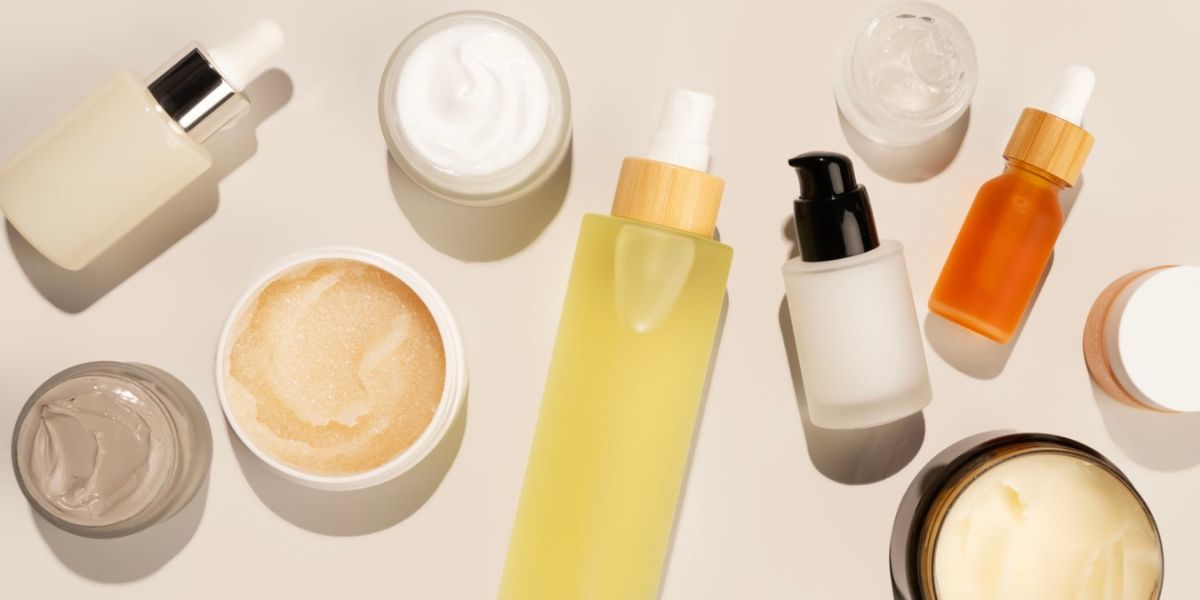
SPF for Blue Light Protection
- Physical Protection: When selecting a sunscreen, seek for specific chemicals that provide physical protection from blue light. These are Niacinamide, Gossypium Herbaceum, and Zinc Oxide. These substances function as blue light barriers, giving additional skin protection.
- Comprehensive Coverage: Examine the product label to confirm that the sunscreen protects against blue light. This extensive coverage is vital for protecting the skin from environmental irritants, such as blue light.
Antioxidant-rich formulations
Enhancing Protection: Including antioxidants in your skincare routine can help to protect against blue light-induced damage. Look for skincare products with components like vitamin E and niacinamide. These antioxidants are essential for neutralizing free radicals and strengthening the skin’s natural defense systems against blue light.
Hydration and Barrier Support
Hydration is crucial. Maintaining a well-hydrated skin barrier is essential for preventing blue light damage. Use moisturizers and serums with moisturizing components such as Hyaluronic Acid. These compounds help to keep the skin hydrated and resilient, boosting its natural defenses against blue light damage.
Additional Methods to Protect Your Skin From the Blue Light
Level blue light glasses: Investing in glasses that block blue light is something you should think about doing. These glasses can assist minimize the quantity of blue light that reach your skin and protect the sensitive skin around your eyes from the harmful effects of digital radiation.
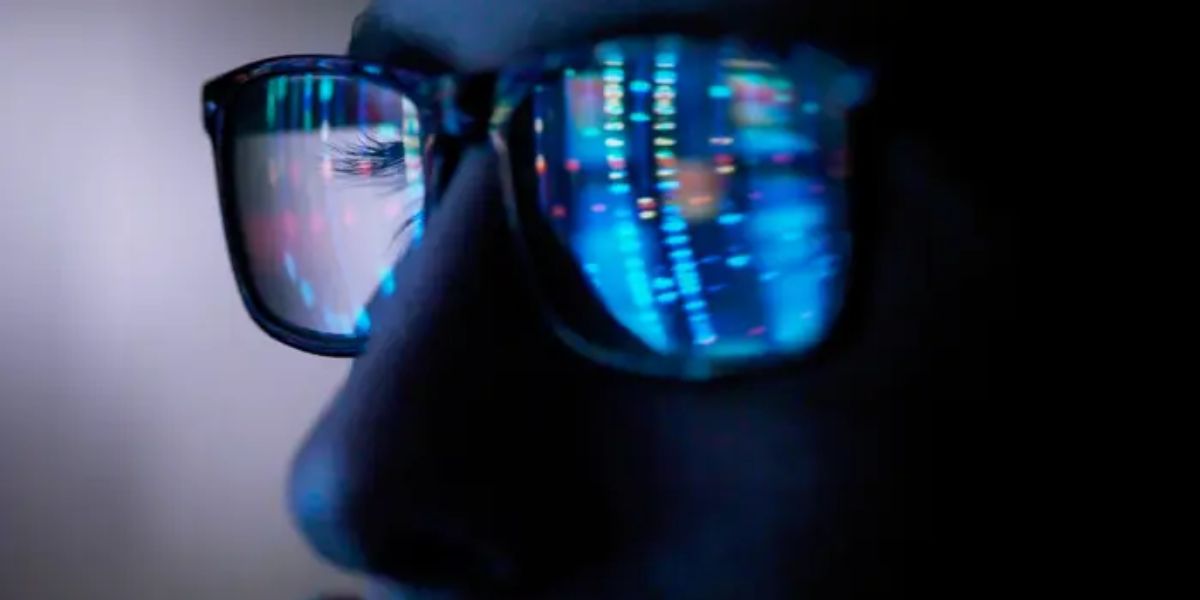
Cut down on screen time: By taking frequent breaks from your electronic devices, you can cut down on the total amount of time you spend looking at screens. Include activities that do not include the use of a screen in your daily routine in order to provide your skin with a break from the constant exposure to blue light.
Settings for the screen display: An increasing number of electronic devices now come equipped with options that enable users to lessen the quantity of blue light that is generated by the screen. It is possible to reduce the amount of blue light that you are exposed to by adjusting these settings, for as by using the night mode feature on your computer or smartphone.
Physical Barriers: It is important to establish physical barriers between your skin and electrical equipment whenever it is possible to do so. For instance, reducing the amount of blue light that is directly directed toward your face can be accomplished by utilizing a laptop stand or holding your smartphone at arm’s length.
Blue Light and the Aging Process: The Science Behind It
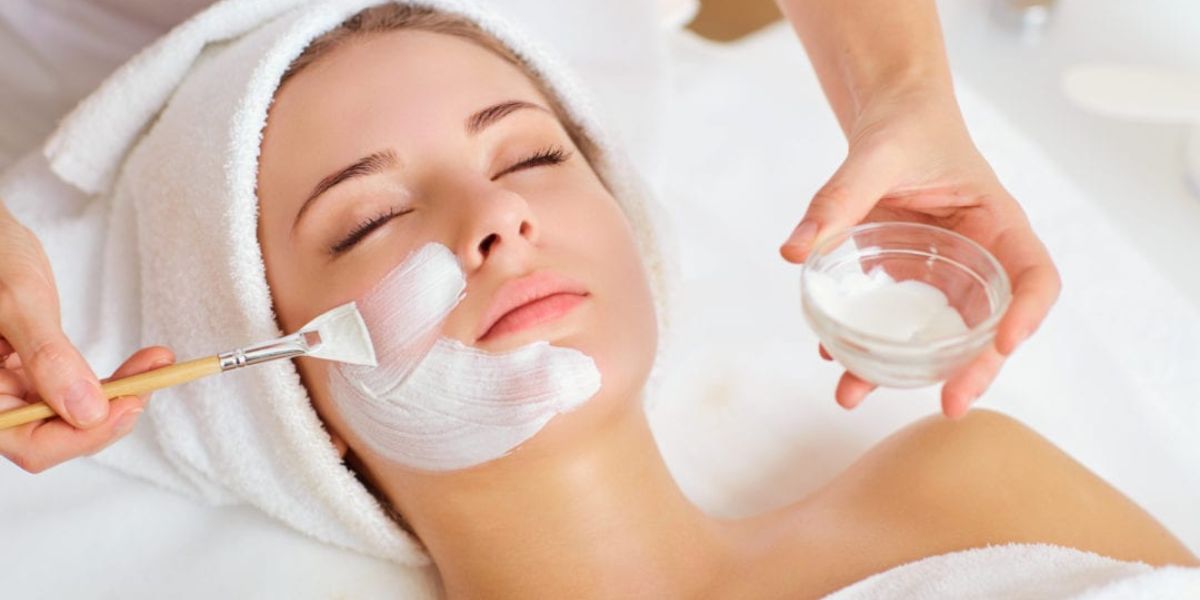
In addition to the sun, artificial sources such as digital screens and LED lighting are also responsible for the emission of blue light, which is a component of the visible light spectrum. According to the findings of recent research, extended exposure to blue light may be a factor in photoaging, which is the process of aging that occurs as a result of exposure to light.
The mechanism involves blue light reaching deeper into the skin than UV rays do, which may lead to oxidative stress, which can damage skin cells and collagen. Blue light is thought to be responsible for this phenomenon. It is possible that this could cause accelerated aging of the skin, which will be characterized by wrinkles, loss of suppleness, and hyperpigmentation.
Will Blue Light Skincare Be Around for the Long Term in the Future of Anti-Aging?
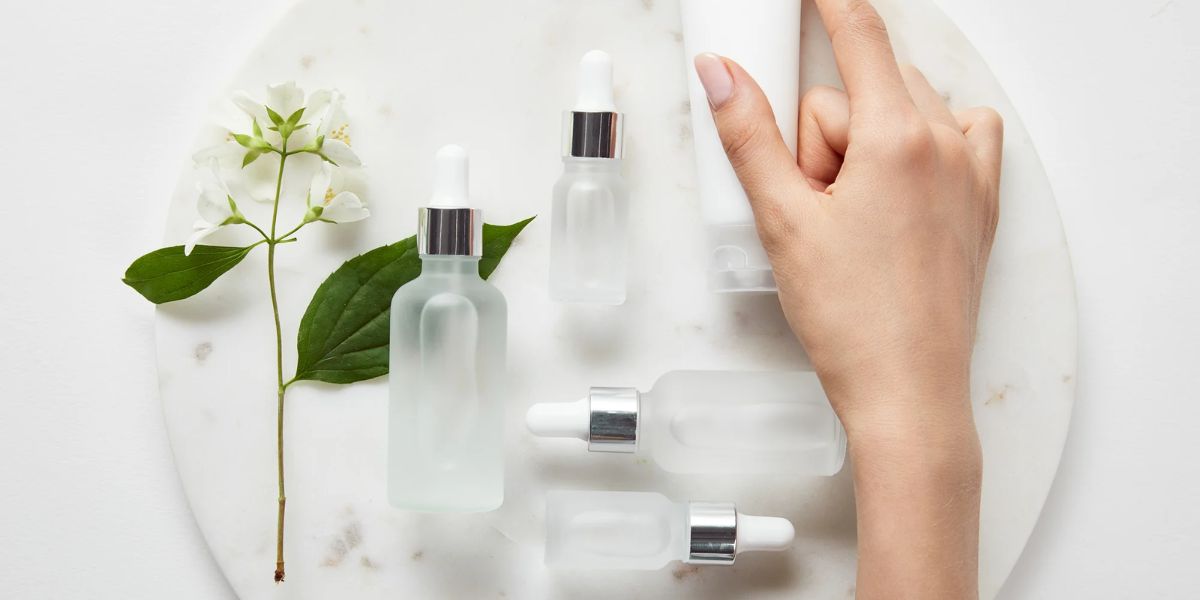
New fashions and technology are continuously being introduced, and the beauty business is undergoing a period of tremendous evolution. The idea of using blue light for skincare is very recent and coincides with the issues that the digital world represents.
In view of the growing knowledge of the potential adverse effects that blue light may have on the skin, it is highly probable that items that give protection against blue light will become more widely available. Because of the ever-increasing prevalence of digital devices, it is possible that these products will become vital components of anti-aging skincare regimes in the years to come.
Are You Ready to Make an Informed Decision: Is Blue Light Skincare the Right Choice for You?
There are a number of considerations to take into account before deciding whether or not to use blue light skincare in your routine. Think about how much time you spend in front of screens on a daily basis, how much time you spend outside, and how your skin is now feeling. In the event that you spend a substantial amount of time in the sun or in front of digital devices, blue light skincare may be advantageous to you.
On the other hand, it is very necessary to seek the advice of a dermatologist in order to gain an understanding of the specific requirements of your skin and to select products that are supported by evidence and appropriate for your skin type.


